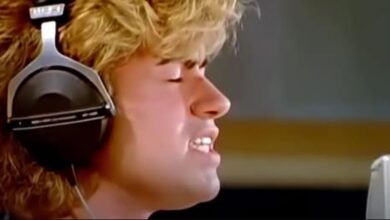The 1962 No. 1 Hit: An Ageless Masterpiece That Still Resonates Impressively Today
“Big Girls Don’t Cry” by Frankie Valli and the Four Seasons is a quintessential example of the group’s classic sound, characterized by Valli’s soaring falsetto and the group’s tight harmonies. Released in October 1962, it quickly followed their previous hit “Sherry,” and similarly dominated the charts, reaching number one on the Billboard Hot 100 and remaining there for five weeks.
The inspiration for “Big Girls Don’t Cry” is somewhat debated. Frankie Valli once attributed the song’s title to a line from a Clark Gable movie. However, co-writer Bob Gaudio has a different recollection, stating that the idea came to him while he was dozing off during a Ronald Reagan film, “Tennessee’s Partner,” when he heard the line, “Big girls don’t cry.” This discrepancy adds to the song’s lore, contributing to its enduring appeal.
The song was penned by Bob Gaudio and producer Bob Crewe. Gaudio, a pivotal member of the Four Seasons, played a significant role in shaping the group’s sound. He later produced albums for artists like Frank Sinatra and Neil Diamond. The song’s production included contributions from David “Panama” Francis, a renowned jazz drummer whose rhythmic input added to the song’s distinctiveness.
“Big Girls Don’t Cry” also featured on the Four Seasons’ debut album, “Sherry & 11 Others,” and its success cemented the group’s place in the annals of pop music history. The Four Seasons, originally known as the Four Lovers, comprised Frankie Valli, Bob Gaudio, Tommy DeVito, and Nick Massi. Their harmonizing skills and doo-wop influence set them apart from other groups of the era.
The song’s cultural impact extended beyond its initial release. It was frequently featured in the television series “Happy Days,” symbolizing the nostalgic 1950s and 1960s era the show depicted. Moreover, “Big Girls Don’t Cry” appeared in the iconic 1987 film “Dirty Dancing,” further embedding it into the fabric of American pop culture. Its resurgence in popularity during the 1980s led to the song re-entering the UK charts for the first time in 25 years.
The song’s induction into the Grammy Hall of Fame in 2015 attests to its lasting legacy. Despite the passing of original members Nick Massi and Tommy DeVito, the music of the Four Seasons continues to resonate. Frankie Valli, now in his late 80s, remains active in the music scene, demonstrating the enduring appeal of the group’s classic hits.
Frankie Valli himself, born Francesco Stephen Castelluccio, rose to fame with his powerful falsetto voice. His career spans several decades, both as a solo artist and as the frontman of the Four Seasons. The group’s story, immortalized in the Broadway musical “Jersey Boys,” highlights their journey from Newark street corners to international stardom, underscoring the timeless nature of their music.





